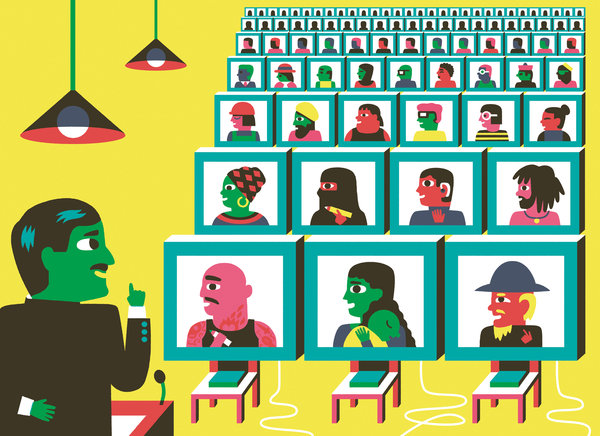A conclusion?is the place where?you get tired of thinking.
? ? ? ? ? ? ? ? ? ? ? ? ? ? ? ? ? ? ? ? ? ? ? ? ? ? ? ? ? ? ? ? ? ? ? ? ? ? ?Arthur Bloch?
Like my friend Miguel over at Around the Corner, I have been reading a lot about Massively Open Online Courses (MOOCs) lately and wondering if it is worth investing my time and energy in learning more about them from a K-12 perspective. ?(Here is the Wikipedia's description.)
Some of my favorite thinkers published on the subject of MOOCs recently. (Emphasis mine.)
Scott McLeod in?MOOCs are here. How should state universities respond??shares a paper by two Iowa State University statistics professors who warn:
Almost inevitably, the advent of large-enrollment, on-line college courses will put many colleges and universities out of business, and dramatically reduce the size of many others. In this new environment, there may also be opportunities for some educational institutions to offer new and valuable components to college education (even if much-reduced in scale relative to plans they have made in the past). But this will not happen without serious and realistic thought and planning ? of a qualitatively different nature than has ever been needed before ? by administrators and faculty.
Larry Cuban in his blog post?"Irrational Exuberance": The Case of MOOCs?observes:
Where the incoherence and mindlessness enter the picture is the current thinking among university officials and digital-minded faculty that delivering a degree or college-level courses to anyone with an Internet connection will revolutionize U.S. higher education institutions. While teaching is clearly an important activity of universities, doing research and publishing studies is the primary function. The structures (e.g., departmental organization, professional schools) and incentives (e.g., tenure, promotion) of top- and middle-tier institutions drive tenure, promotion, and time allocation for faculty. MOOCs will do nothing to alter those structures and incentives. If anything, MOOCs could accelerate and deepen the split between tenure-line faculty and adjuncts with the latter taking on these larger courses for a pittance. To think that such offerings by professors will transform higher education gives new meaning to the word ?flaky.??
NYT columnist Thomas Friedman, "Revolution Hits the Universities"?pundits (is this a verb?):
Lord knows there?s a lot of bad news in the world today to get you down, but there is one big thing happening that leaves me incredibly hopeful about the future, and that is the budding revolution in global online higher education. Nothing has more potential to lift more people out of poverty ? by providing them an affordable education to get a job or improve in the job they have. Nothing has more potential to unlock a billion more brains to solve the world?s biggest problems. And nothing has more potential to enable us to reimagine higher education than the massive open online course, or MOOC, platforms that are being developed by the likes of Stanford and the Massachusetts Institute of Technology and companies like Coursera and Udacity.
Here is my conclusion (see opening quote): The impact of MOOCs will depend less about technology and more about whether formal educational institutions and the credentials they grant still have validity in our society.?
To me it seems we are coming up on a two-tiered educational system.
The traditionalists will continue to look for dentists, doctors, engineers, teachers, and others who have licenses and degrees from accredited insitutions of higher education. (I've always thought that certificate on my dentist's wall was comforting as the drill comes nearer.) Traditional parents will continue to save and borrow to send their children to these schools, despite growing evidence there is little economic payback for many so educated. Traditional students will continue to worry about grades, class rank, and school prestige. Traditional employers will ask for college degrees in job descriptions.
But I see the potential for a growing group on non-traditionalists who find other means, less expensive and perhaps more meaningful, of demonstrating their competency in a field - badges, certificates of completion, apprenticeship programs, competency testing, portfolios of work, and resumes of successful products with recommendations. Parents will support this alternative means of "gettin' educated" and employers will pay more attention to past performance than degrees. And students themselves will see education's purpose as meeting vocational and personal needs rather than simply a hoop through which society expects its members to jump if they are to be valued.
As society in developed nations stratfies into what seems like the wealthy and the poor, as formal education loses ground as a guarantee of upward mobility and financial success, and as developing countries see the need to find inexpensive means of educating masses of people, the non-traditional view of education will grow. (If I am in a poor country and I have the choice of no dentist or a dentist who has received some alternative form of training, hey, I know what I'd do.)
These may be famous last words, but as long as U.S. K-10 schools have not only educational but custodial responsibilites for kids, I don't see MOOCs as a real game changer. However we may see more students ages 16+ drop out of high school to pursue other non-traditional learning opportunities, especially if we don't figure out how to personalize education in ways that serve non-traditional learners.?
Blue Skunk readers, is it worth learning more about MOOCs?
See also How Important is Certification (for librarians)??
?

Image source
Source: http://doug-johnson.squarespace.com/blue-skunk-blog/2013/1/29/moocs-need-k-12-pay-attention.html
declaration of independence 4th Of July 2012 Zach Parise Spain Vs Italy Euro 2012 Pepco erin andrews erin andrews
No comments:
Post a Comment
Note: Only a member of this blog may post a comment.